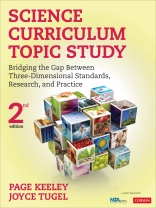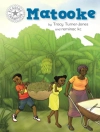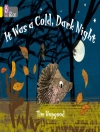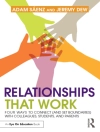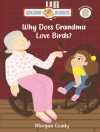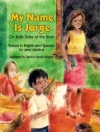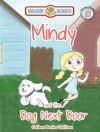Today’s science standards reflect a new vision of teaching and learning. | How to make this vision happen
Scientific literacy for all students requires a deep understanding of the three dimensions of science education: disciplinary content, scientific and engineering practices, and crosscutting concepts. If you actively engage students in using and applying these three dimensions within curricular topics, they will develop a scientifically-based and coherent view of the natural and designed world.
The latest edition of this best-seller, newly mapped to the Framework for K-12 Science Education and the Next Generation Science Standards (NGSS), and updated with new standards and research-based resources, will help science educators make the shifts needed to reflect current practices in curriculum, instruction, and assessment. The methodical study process described in this book will help readers intertwine content, practices, and crosscutting concepts. The book includes:
• An increased emphasis on STEM, including topics in science, technology, and engineering
• 103 separate curriculum topic study guides, arranged in six categories
• Connections to content knowledge, curricular and instructional implications, concepts and specific ideas, research on student learning, K-12 articulation, and assessment
Teachers and those who support teachers will appreciate how Curriculum Topic Study helps them reliably analyze and interpret their standards and translate them into classroom practice, thus ensuring that students achieve a deeper understanding of the natural and designed world.
Tabela de Conteúdo
LIST OF CURRICULUM TOPIC STUDY GUIDES
PREFACE
ACKNOWLEDGMENTS
ABOUT THE AUTHORS
CHAPTER 1. INTRODUCTION TO CURRICULUM TOPIC STUDY (CTS)
What Is Curriculum Topic Study (CTS)?
Why Study a Curriculum Topic?
Why Focus on Topics?
CTS Impacts Beliefs About Teaching and Learning
CHAPTER 2. THE CURRICULUM TOPIC STUDY GUIDE AND ITS COMPONENTS
The CTS Study Guide
Collective Resources Used in the CTS Guides
CHAPTER 3. USING CURRICULUM TOPIC STUDY
CHAPTER 4. USING AND APPLYING CURRICULUM TOPIC STUDY
CHAPTER 5. THE CURRICULUM TOPIC STUDY GUIDES
Category A: Life Science Guides
Category B: Physical Science Guides
Category C: Earth and Space Science Guides
Category D: Scientific and Engineering Practices Guides
Category E: Crosscutting Concepts Guides
Category F: STEM Connections Guides
REFERENCES
INDEX
Sobre o autor
JOYCE TUGEL has been a leader in science education since she left the classroom in 2001 to become the science professional development specialist at the TERC Eisenhower Regional Alliance. In 2005 she came to work with Page Keeley at the Maine Mathematics and Science Alliance, as a K-12 science specialist, where she managed and directed several projects and provided professional development support to schools and districts throughout New England and nationally. Recently “retired” from the Maine Mathematics and Science Alliance, today she works as an independent K-12 STEM/Science Education Consultant. Her work primarily focuses on professional development in the areas of science curriculum, instruction and formative assessment, teacher leadership, service and place-based learning, and implementation of the Next Generation Science Standards. She is the lead professional development consultant for Curriculum Topic Study.
Joyce is a contributing author of two books in the Uncovering Student Ideas in Science series (NSTA Press) and is a co-author of Science Curriculum Topic Study: Bridging the Gap Between Three-Dimensional Standards, Research, and Practice (2nd edition, Corwin/NSTA Press). Joyce has also authored articles for the NSTA journals, Science and Children and The Science Teacher.
Prior to leaving the classroom, Joyce taught high school chemistry & physical science for 10 years. As an active teacher leader, she collaborated with the Maine Department of Education and the Maine Mathematics and Science Alliance. During her teaching career, Joyce received the Presidential Award for Excellence in Secondary Science Teaching in 1998, the Milken Foundation National Distinguished Educator Award in 1999, and the New England Institute of Chemists Secondary Teaching Award in 1999. As a dedicated NSTA member, she was the NSTA District II Director from 2000-2003 and the Professional Development Division Director from 2003-2006. She has served on the board of directors of both the National Science Education Leadership Association and the National Science Teachers Association. She is also a Cohort 3 Fellow of the National Academy for Science and Mathematics Education Leadership. Joyce also has a strong interest in global science education and has co-led science/STEM education delegations to Iceland (2017), Panama (2018), and Costa Rica (2019) with Page. Prior to entering the teaching profession, Joyce was a researcher in environmental biogeochemistry at the University of New Hampshire and liked to “dabble in mud”! She received her B.S. and M.S. degrees in Microbiology from the University of New Hampshire. In her “spare time” she enjoys photography, breadmaking, knitting, and exploring the world with her grandchildren. A New Hampshire resident for 40 years, Joyce and her husband reside in Barrington, NH. Joyce can be contacted at [email protected].
